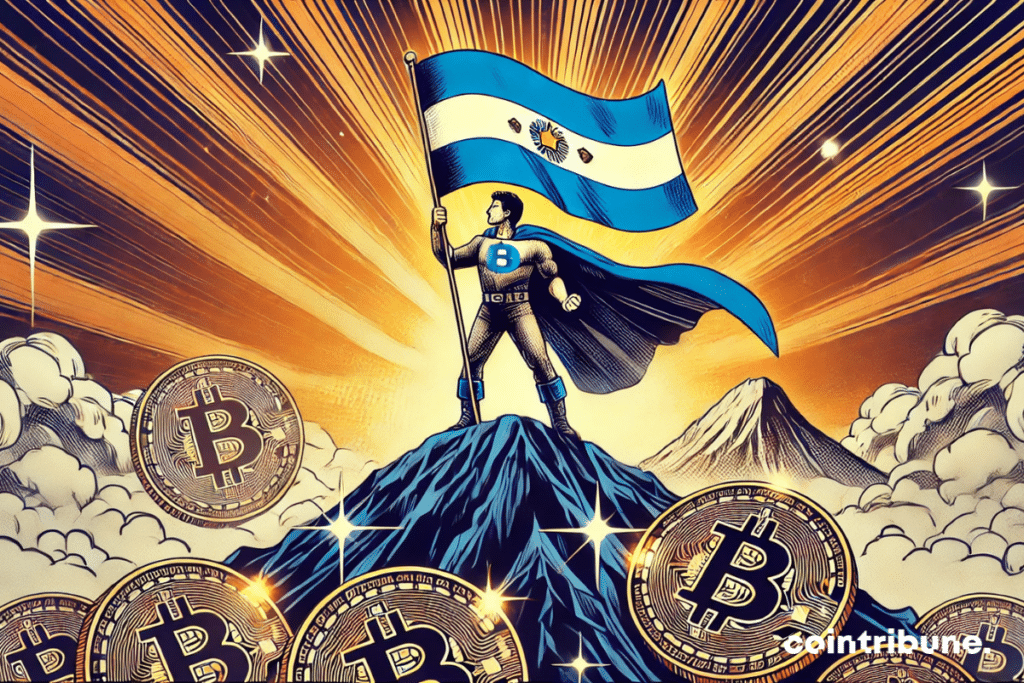6,000 BTC And Counting : El Salvador’s Crypto Experiment
In the global landscape of finance, few nations dare to adopt a strategy as bold as that of El Salvador. Under the leadership of President Nayib Bukele, this Central American country is establishing itself as a forerunner in cryptocurrency adoption. With the achievement of the symbolic milestone of 6,000 BTC accumulated, El Salvador is not only reinforcing its commitment to Bitcoin but also aims to transform this cryptocurrency into a cornerstone of its economic and diplomatic strategy. This unprecedented gamble provokes admiration from proponents of decentralized finance as well as criticism from international institutions, which warn against the risks associated with such exposure.

Recent acquisitions : El Salvador reaches 6,000 BTC
On December 29, El Salvador reached a new milestone by adding one Bitcoin to its national wallet. This acquisition increases the country’s reserves to 6,000.77 BTC, a value estimated at $569.3 million at current prices. Since 2021, when the country took a pioneering role by adopting Bitcoin as legal tender, the government has pursued a policy of regular purchases, thereby consolidating its unique position on the global crypto stage. Thus, according to the National Bitcoin Office, these purchases have been made at an average cost of $45,450 per unit, generating a notable return of 108.02 %.
This new investment comes in a context where the economic choices of President Nayib Bukele continue to divide international opinion. The International Monetary Fund (IMF) has notably renewed its warnings, urging the country to reduce its exposure to cryptocurrencies. Despite this criticism, Stacy Herbert, director of the National Bitcoin Office, has stated in a post on X (formerly Twitter) on December 19, 2024, that Bitcoin “remains our main strategy.” This statement reflects El Salvador’s determination to maintain its trajectory despite the doubts expressed by global financial institutions.
A bold strategy : between national support and international criticism
El Salvador now asserts itself as a full member of an exclusive circle of nations alongside the United States, China, the United Kingdom, Ukraine, and Bhutan, which hold over 6,000 BTC. This positioning reflects an ambitious strategy aimed at placing the country at the heart of the global cryptosphere to attract foreign investments. In this perspective, the Bukele government has multiplied initiatives, notably by forging strategic partnerships. Among them, the agreement with Bitget aims to strengthen local crypto infrastructure and promote broader adoption of these assets within the population.
However, this policy continues to provoke sharp criticism on the international stage. The agreement signed with the International Monetary Fund (IMF), amounting to $1.4 billion, remains under tension, as the IMF insists that the country limits its exposure to Bitcoin. Meanwhile, questions are multiplying regarding the management of the “Chivo Wallet,” an application developed by the state to facilitate Bitcoin transactions. According to recent statements, this solution could be replaced by private alternatives, raising doubts about the continuity of public efforts to frame the use of cryptocurrencies. These challenges illustrate the complexity of such an initiative, which is both a source of economic opportunities and political controversies.
The strategy adopted by El Salvador raises questions about its long-term economic viability and the potential consequences for its financial sovereignty. Through its investments in Bitcoin despite warnings from international organizations like the IMF, the country establishes itself as a unique laboratory for the national integration of cryptocurrencies. This choice, bold but controversial, could both enhance El Salvador’s economic attractiveness and exacerbate its financial and diplomatic vulnerabilities.
Maximize your Cointribune experience with our "Read to Earn" program! For every article you read, earn points and access exclusive rewards. Sign up now and start earning benefits.
Diplômé de Sciences Po Toulouse et titulaire d'une certification consultant blockchain délivrée par Alyra, j'ai rejoint l'aventure Cointribune en 2019. Convaincu du potentiel de la blockchain pour transformer de nombreux secteurs de l'économie, j'ai pris l'engagement de sensibiliser et d'informer le grand public sur cet écosystème en constante évolution. Mon objectif est de permettre à chacun de mieux comprendre la blockchain et de saisir les opportunités qu'elle offre. Je m'efforce chaque jour de fournir une analyse objective de l'actualité, de décrypter les tendances du marché, de relayer les dernières innovations technologiques et de mettre en perspective les enjeux économiques et sociétaux de cette révolution en marche.
The views, thoughts, and opinions expressed in this article belong solely to the author, and should not be taken as investment advice. Do your own research before taking any investment decisions.